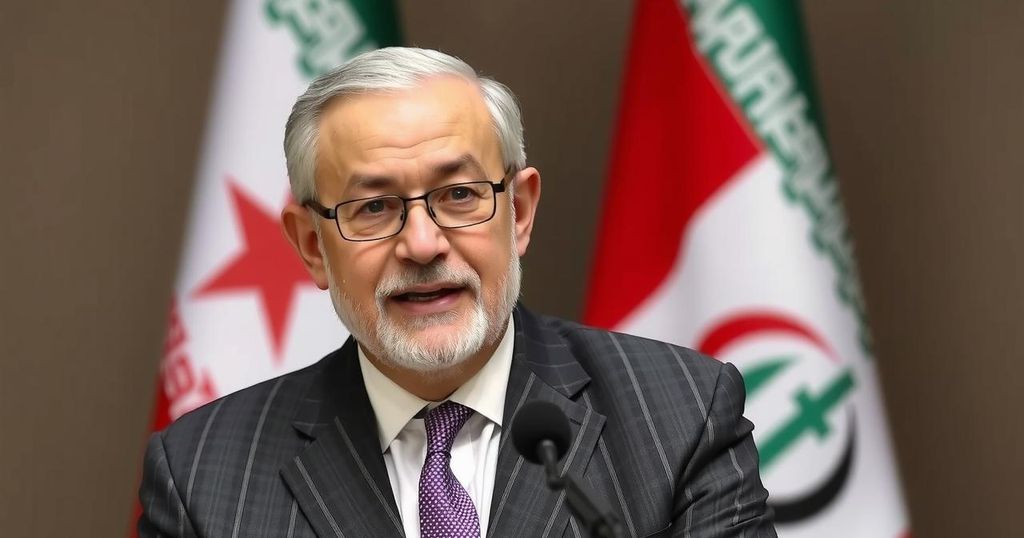Syria’s Foreign Minister Urges Iran to Respect Sovereignty and Avoid Chaos
Syria’s newly appointed foreign minister, Asaad Hassan al-Shibani, warned Iran against actions that could lead to chaos in Syria. His call comes after Ayatollah Ali Khamenei urged Syrian youth to oppose those causing insecurity. This exchange highlights the deteriorating relationship between Syria and Iran as Syria asserts its sovereignty post-civil war.
In a recent statement, Asaad Hassan al-Shibani, Syria’s newly appointed foreign minister, urged Iran to refrain from actions that may lead to chaos in Syria, emphasizing respect for the Syrian people’s will and the nation’s sovereign rights. He articulated this message through a post on X, asserting, “We warn them from spreading chaos in Syria and we hold them accountable for the repercussions of the latest remarks.” This statement comes amidst rising tensions following comments made by Iran’s Supreme Leader, Ayatollah Ali Khamenei, who encouraged Syrian youth to oppose insecurity and disarray in their country by standing firm against its orchestrators.
On Sunday, Khamenei called on the youth of Syria to rise against those responsible for the country’s turmoil. He stated, “Today Syrian youth have nothing to lose. Their schools, universities, homes, and streets are unsafe,” predicting that a determined and strong group would emerge from this turmoil. This perspective follows a significant shift in the Syrian civil conflict, where Syrian rebels successfully ousted President Bashar al-Assad in December, following a protracted war that lasted over a decade. Khamenei’s comments reflect Iran’s ongoing investment in Syria, having committed substantial resources to support Assad’s regime during the conflict.
The Syrian crisis underscores the geopolitical complexities in the region, particularly concerning Iran’s influence and its efforts to maintain a foothold in Syria. The recent remarks signify a growing rift as al-Shibani’s warning acts as a counter to Khamenei’s directive, challenging Iran’s narrative. This development draws attention to the uncertain future of Iran’s involvement in Syria, particularly in light of Assad’s overthrow, which weakened the prominent Iran-led alliance opposing Western and Israeli interests in the Middle East.
In conclusion, the relationship between Syria and Iran is in a delicate state as Syria’s foreign minister cautions Iran against contributing to instability in Syria. With local sentiments shifting and geopolitical alliances constantly evolving, it remains to be seen how these tensions will affect the broader landscape in the Middle East. The statements from both leaders reflect the intricate dynamics at play as Syria navigates its political future amidst external influences.
Syria has been embroiled in a complex civil war since 2011, which has deeply affected its political landscape and brought various international actors into the fray, notably Iran and Russia supporting President Bashar al-Assad. Iran’s involvement has been significant, as it has provided military and financial aid to Assad’s regime throughout the conflict. As the war drew to a close, the dynamics shifted, with various factions vying for control and influence within a post-conflict Syria. The recent appointments and statements from Syrian officials illustrate a critical moment in which Syria is asserting its sovereignty while balancing Iranian influence in its domestic affairs.
The warning from Syria’s foreign minister to Iran underscores the fragility of the situation in Syria following the civil war. As both nations navigate their respective interests, the calls for mutual respect of sovereignty highlight the complex interplay of internal and external influences shaping Syria’s future. Ultimately, the evolution of these relationships will be pivotal in determining stability and governance in the region moving forward.
Original Source: www.hindustantimes.com




Post Comment